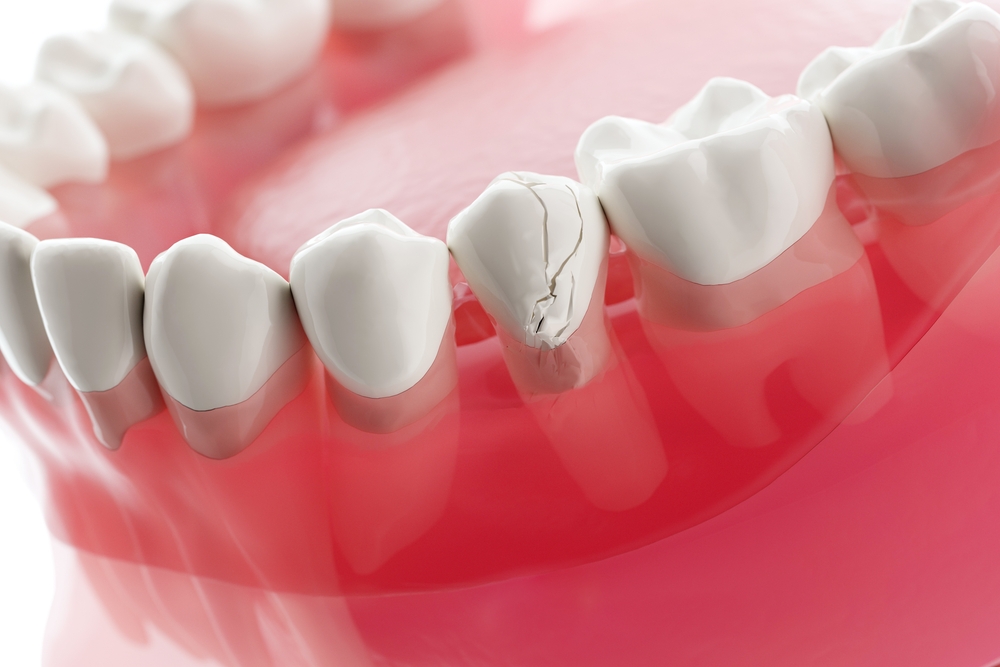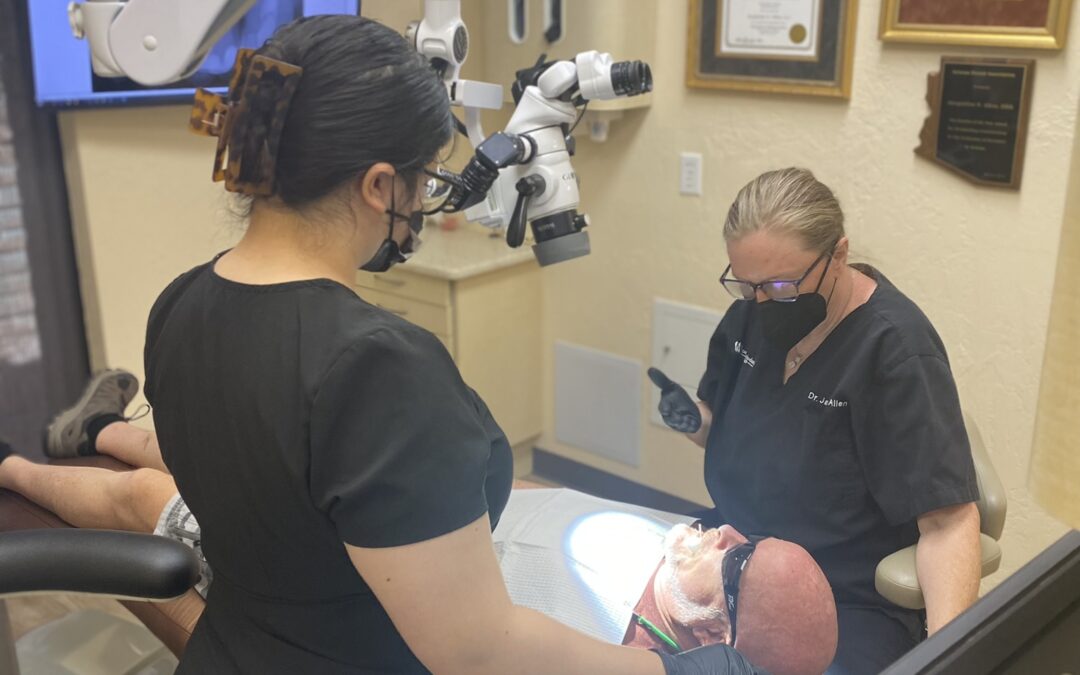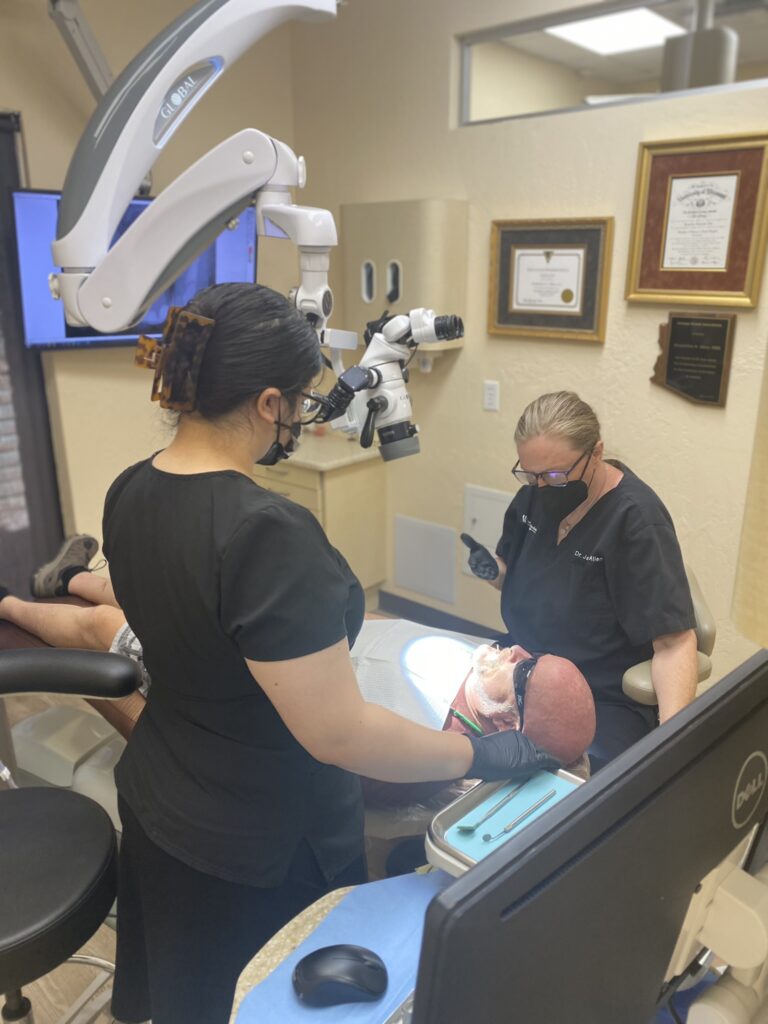
by Dr. Jacqueline S. Allen | Jan 5, 2025 | Dental Fear, IV Sedation

Anxious about facing a root canal? A 2019 survey by the American Association of Endodontists reported that more Americans surveyed feared having a root canal (59 percent) than feared holding a live snake in their lap (53 percent) or swimming with sharks (41 percent).
Root canal anxiety is a subset of a more general anxiety concerning dental treatment. Since delaying or avoiding root canal treatment can lead to natural tooth loss or abscessed teeth, it’s important to have a plan for confronting (and overcoming!) your fears.
We have five great tips to help you overcome root canal fears and set yourself up for success.
Tips To Overcome Anxiety About A Root Canal Treatment
- Accept that your anxiety is real. There are many reasons you may feel nervous. Perhaps you experienced pain with a dentist, or are embarrassed by your teeth. An abuse history may amplify your concerns. None of these conditions make you “bad.” They simply suggest you’ll benefit from extra support preparing for your root canal.
- Figure out which part of a root canal is most triggering. Try to break your root canal anxiety into smaller chunks. Are you afraid of having your mouth opened? Of having no control over the procedure? The sounds and smells? Once you know, share it with your personal support team – including your endodontist – so they can help you manage the fear.
- Try root canal anxiety-reduction techniques recommended by others. Dental Fear Central is a clearinghouse website filled with tips for dealing with dental anxiety and phobia. There’s a special FAQ section for anxiety related to root canals.
- Explore mindfulness meditation. Researchers at Harvard University have affirmed that meditation focusing on “being present” in the moment can reduce anxiety symptoms. Dr. Ron Siegel, assistant professor of psychology at Harvard, offers free, short guided mindfulness meditations on his website.
- Ask your endodontist about IV sedation. At the Phoenix Endodontic Group, we offer IV sedation as an option for root canals, emergency dental treatment and dental implant surgery. We find this can sometimes be the best option to support our patients’ comfort.
Never Fear – We Can Help With Your Root Canal Anxiety
Don’t let fear, myths about root canals, or prior experiences keep you from treatment. At our practice, we explain what to expect during and after treatment – and how we can work together for a stress-free experience. Call us at 602-242-4745 to schedule your appointment.

by Dr. Jacqueline S. Allen | Dec 5, 2024 | Tooth Abscess

When you have a toothache, you don’t care why it hurts – you just want it to STOP. Many toothaches are caused by an abscessed tooth, which is a pocket of pus (infection) located near your tooth. Visiting an endodontist can not only help end the pain, it can also help you strategize to maintain your long-term dental health.
Tooth Abscess Causes And Symptoms
A tooth abscess happens when the nerve-rich pulp inside your tooth becomes infected. Such an infection can have many causes, including:
- A cracked or chipped tooth
- Severe, untreated tooth decay
- Gum disease spread to the tooth roots
- A dental injury exposing the nerve pulp to bacteria
Once a dental infection, regardless of cause, progresses to an abscess, your symptoms may include:
- An open, draining sore on your gums, or a “boil” near your tooth
- Swollen, red gums
- Bad breath
- Gnawing or throbbing pain
- Pain that radiates into your neck, jawbone, or ear
- Bitter taste in your mouth
- Fever and a general feeling of illness
An endodontist will use X-rays or other imaging tools like Cone Beam Computed Tomography (CBCT) to evaluate your teeth and see whether the tooth abscess is located at your tooth’s root, near the bones and ligaments supporting your tooth, or in the gums around your tooth.
Treating A Tooth Abscess The Endodontic Way
The most common treatment to save an abscessed tooth is a root canal. At the Phoenix Endodontic Group, we use the leading-edge GentleWave treatment system to thoroughly clean and remove infected tooth pulp. An endodontist fills the tooth roots with gutta-percha or another biocompatible substance. Later, a general dentist will add a crown to provide permanent structural support to the tooth.
Call Us About Your Tooth Abscess ASAP
If you’re worried your toothache may be due to an abscessed tooth, call the Phoenix Endodontic Group at 602-242-4745 to arrange an appointment. Infected teeth can pose a serious risk to your health. We offer 24/7 emergency care, so if you’re in pain, call right away!

by Dr. Jacqueline S. Allen | Nov 4, 2024 | Cracked Teeth

Perhaps if we were able to treat cracked or broken teeth with the ease of treating broken bones, more people would seek treatment promptly. Unfortunately, cracked teeth are often invisible to the outside world, and small enough that, even though they can cause a great deal of pain, those who suffer them feel as if “toughing it out” without treatment is a workable option.
The sad truth about cracked teeth is that, unlike bones, they will never mend without attention from a dental professional. Fractured teeth can lead to tooth decay and serious infection, so it’s critical to have cracked teeth cared for immediately.
Answers To Common Questions About Cracked Teeth
Many people delay treatment of a cracked tooth from lack of knowledge of its nature. Here’s a review of some helpful information about cracked teeth.
What are some causes of cracked teeth?
Most cracked teeth happen because the teeth encounter a strong force – like being hit in the mouth with a basketball or falling face-first on a pool deck – or because the teeth have been weakened by tooth decay, or through a combination of those factors. Other potential causes include biting down on ice, popcorn kernels or hard candy, and bruxism (teeth grinding).
What are common symptoms of cracked teeth?
With a minor crack, you may only know because you can see it or feel it with your tongue. More seriously cracked teeth can result in pain when you bite down, sensitivity to hot or cold substances, or swelling around the tooth.
How does an endodontist treat a cracked tooth?
Treatment for your cracked tooth will depend on the crack. Your general dentist may be able to repair a minor crack using dental bonding. If the crack is more than superficial, particularly if the damage extends to the interior of the tooth, an endodontist may perform a root canal to save the tooth. A root canal removes infected nerve pulp and replaces it with a biocompatible filler material. The process is completed with a crown, which protects the treated natural tooth from infection and decay.
Don’t Ignore Cracked Teeth – Get Seen Today!
A cracked tooth can rapidly escalate from nuisance to emergency. Call the Phoenix Endodontic Group at 602-242-4745 to arrange urgent care for your cracked or broken tooth.

by Dr. Jacqueline S. Allen | Oct 9, 2024 | National Dental Hygiene Month
 Whether you believe “Well begun is half done” was said by film character Mary Poppins or by the ancient Greek philosopher Aristotle, it’s a useful adage. Even if you didn’t get a great start with dental hygiene as a child, it’s not too late to improve your oral health. Make positive changes, and you will see more positive dental outcomes.
Whether you believe “Well begun is half done” was said by film character Mary Poppins or by the ancient Greek philosopher Aristotle, it’s a useful adage. Even if you didn’t get a great start with dental hygiene as a child, it’s not too late to improve your oral health. Make positive changes, and you will see more positive dental outcomes.
October is National Dental Hygiene Month, which celebrates the hard work that dental hygienists do and promotes the value of good oral self-care. In that spirit, the Phoenix Endodontics Group offers a few tips for building strong natural teeth. Proper dental hygiene and daily self-care can build (or re-build) your teeth, protect them from decay, and improve their resilience to events like impact injuries.
Dental Hygiene Tips for Healthy, Strong Teeth
Establish or re-commit to a daily oral health routine. Brushing twice daily and flossing are essential to removing bacterial plaque, which can build up on teeth and cause tooth decay. Augment these two pillars of dental hygiene with daily use of a fluoride-based mouthwash.
Eat and drink tooth-friendly foods and beverages. Milk, yogurt, and cheese are excellent sources of calcium. Fibrous veggies and fruits, including berries or carrots, provide Vitamin C to protect your gums and stimulate saliva, which protects against dry mouth. Other foods – such as meat, poultry and eggs or leafy greens like kale or spinach – contain the helpful nutrients phosphorus and Vitamin A, which work with calcium to protect your tooth enamel.
Stop tobacco use and limit alcohol consumption. Chronic tobacco and alcohol usage can damage your teeth and gums. The less you indulge in these, the better.
Visit your dentist regularly. Office visits to your general dentist provide the best chance to track and assess any emerging oral health issues. Prophylactic teeth cleaning removes bacterial plaque hardened into tartar. If needed, your provider may use fluoride treatments or dental sealants to further protect your teeth.
Address possible threats to your teeth. Your dentist can advise how best to treat conditions such as bruxism (teeth grinding) or dry mouth, which can weaken tooth structure if left untreated. An endodontist can provide emergency care if you’ve damaged your teeth in a car accident or while playing a sport, like basketball or hockey.
Improve Your Dental Hygiene Today
Dental professionals, including general dentists and specialists such as endodontists, work together with patients to preserve and protect natural teeth. Take your next steps today toward better dental hygiene by scheduling an appointment with your dentist for an office visit.
Call the Phoenix Endodontic Group to resolve dental conditions requiring a root canal, or for emergency repair of injured teeth. For more information, call our office at 602-242-4745 to schedule a consultation.

by Dr. Jacqueline S. Allen | Sep 4, 2024 | Dental Implants
 If you have failing or missing teeth, you may be investigating dental implants as a possible solution. While root canals can often save natural teeth, sometimes teeth are beyond saving, and retaining a full mouth of teeth is essential for maintaining your natural bite, as well as your natural smile.
If you have failing or missing teeth, you may be investigating dental implants as a possible solution. While root canals can often save natural teeth, sometimes teeth are beyond saving, and retaining a full mouth of teeth is essential for maintaining your natural bite, as well as your natural smile.
Dental implants can be a great investment for many patients. Their long-term success rate is above 90 percent, and nine out of 10 patients say they are happy with the end result. Getting the most out of your implants begins with preparing for your procedure properly. We’ve assembled a list of key tips to get you started on your road to implant success.
6 Tips To Aid Dental Implant Recovery And Post-Recovery Success
- Learn about how dental implants will change your life. It doesn’t hurt to have a little motivation going into your implant surgery! Implants can give you back your full smile and help you erase issues with chewing and speaking clearly. They can also help combat bone loss in your jaw.
- Be aware of any health conditions that could impact your recovery. The dental professional who performs the dental implant will do a thorough exam beforehand. They will address conditions such as diabetes in terms of implant success, as well as dental issues such as bruxism (teeth grinding). They will also discuss your options for addressing the impact of tobacco use on implant success, since smoking reduces bone density and slows wound healing.
- Understand the dental implant process timeline. Being clear about how long the process of placing your implant will take ensures you can take the right steps to focus on your recovery. Your dentist will let you know if you will receive your implant through a “teeth in one day” (one-step) process, or if you will require multiple steps (and appointments) before your implant is complete. They will also discuss whether you need preliminary procedures before the implant, such as bone augmentation, to make sure the implant integrates properly into your jaw.
- Prepare for your initial appointment properly. Some of the steps taken before your dental implant appointment may seem familiar if you’ve had another type of surgery. You’ll receive instructions on things like when to stop smoking before surgery, when to limit food and liquid intake, and any medications you will need to take ahead of the procedure. Follow your dentist’s directions closely, and ask questions if you have concerns.
- Know what to expect immediately after dental implant surgery. You’ll want to take it easy for the first three days after your implant surgery. Your dentist may send you home with pain relievers and antibiotics – if they do, take them as prescribed. It’s normal to experience some minor bruising and bleeding, and for you to feel pain around the implant site, but contact your dentist if these don’t subside quickly. You’ll need to follow a soft-foods diet until your gums heal.
- Develop a self-care routine to ensure dental implant success. You will need to care for your dental implants like natural teeth. That means brushing twice a day, flossing daily, and visiting your dentist regularly. Checkups allow your dental professional to see how the implant is impacting your other teeth and gums and provide suggestions to help you keep your dental implants for a lifetime.
“The recovery period after dental implant surgery is one of the most critical phases of the process,” says Dr. Jacqueline S. Allen, who practices with the Phoenix Endodontic Group. “Our team can walk patients through each step, so you feel confident before, during, and after the procedure.”







 Whether you believe “Well begun is half done” was said by film character Mary Poppins or by the ancient Greek philosopher Aristotle, it’s a useful adage. Even if you didn’t get a great start with dental hygiene as a child, it’s not too late to improve your oral health. Make positive changes, and you will see more positive dental outcomes.
Whether you believe “Well begun is half done” was said by film character Mary Poppins or by the ancient Greek philosopher Aristotle, it’s a useful adage. Even if you didn’t get a great start with dental hygiene as a child, it’s not too late to improve your oral health. Make positive changes, and you will see more positive dental outcomes.
 If you have failing or missing teeth, you may be investigating dental implants as a possible solution. While root canals can often save natural teeth, sometimes teeth are beyond saving, and retaining a full mouth of teeth is essential for maintaining your natural bite, as well as your natural smile.
If you have failing or missing teeth, you may be investigating dental implants as a possible solution. While root canals can often save natural teeth, sometimes teeth are beyond saving, and retaining a full mouth of teeth is essential for maintaining your natural bite, as well as your natural smile.